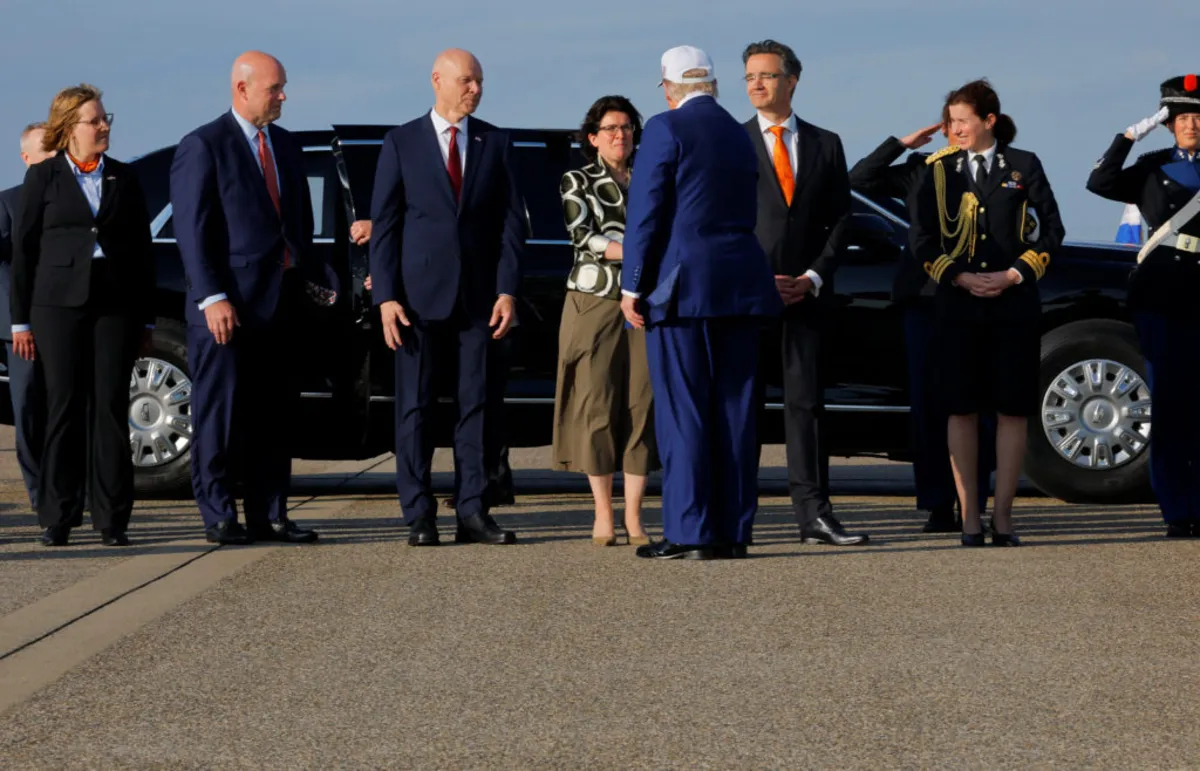
The Hague, Netherlands — President Donald Trump has introduced a wave of uncertainty regarding the United States' commitment to NATO's mutual defense guarantees as he heads to the NATO summit. His recent comments have reignited concerns among European allies about his dedication to the military alliance, which has been a cornerstone of transatlantic security since its inception.
“Depends on your definition,” Trump remarked to reporters while en route to The Hague. He elaborated that there are “numerous definitions of Article 5," the crucial article that states an armed attack on one member is considered an attack on all. “But I’m committed to being their friends,” he added, attempting to reassure allies amid rising tensions.
Later, aboard Air Force One, when pressed for further clarification, Trump expressed his commitment to “saving lives” and prioritizing “life and safety.” However, he refrained from providing more detail, indicating he did not wish to elaborate while in flight. This ambiguity has left many questioning the strength of U.S. support for NATO.
NATO Secretary-General Mark Rutte responded to reporters, asserting his confidence in the U.S. commitment to NATO and the Article 5 guarantee. Rutte’s remarks come as Trump arrived in The Hague shortly after 7:30 p.m., setting the stage for what many anticipate could be another tumultuous appearance by the Republican president at a summit he has often criticized.
The backdrop of this summit is particularly charged, with heightened tensions in the Middle East following Trump’s recent military actions against Iranian nuclear facilities. Additionally, his sudden announcement of a “complete and total ceasefire” between Israel and Iran has further complicated the agenda, leading to a protest in The Hague against the conflict that originally focused on NATO defense spending.
European allies have grown accustomed to Trump's unpredictable nature, as he has consistently expressed disdain for NATO, an organization originally established to counter threats from the former Soviet Union. This unpredictability raises significant concerns regarding the future of NATO amidst ongoing geopolitical challenges.
Trump's debut at the NATO summit in 2017 is perhaps most infamously remembered for his shove of Montenegro's Prime Minister Dusko Markovic, which symbolized his contentious approach to international diplomacy. In subsequent summits, he has questioned the value of NATO and accused member nations of insufficient defense spending. His 2018 proposal for a 4% defense spending target as a percentage of each country’s gross domestic product was met with skepticism but underscored his commitment to increasing military contributions.
“NATO was broke, and I said, ‘You’re going to have to pay,’” Trump reiterated. “Now they’re paying a lot. Then I said, ‘You’re going to have to lift it to 4% or 5%, and 5% is better.’” This push for increased funding has been a signature issue of his presidency, designed to bolster the alliance's collective military capabilities.
Senator Jeanne Shaheen of New Hampshire, a prominent Democrat on the Senate Foreign Relations Committee, will also attend the NATO summit. She warned that any actions by Trump that might divide the alliance could embolden adversaries like China and Russia. “That does not help America, does not help our national security,” she stated, emphasizing the risks of undermining NATO unity.
Trump’s skepticism toward NATO commitments has been evident since his 2016 presidential campaign, during which he suggested he might not adhere to the mutual defense guarantees outlined in Article 5. This sentiment was echoed in a recent rally, where he indicated he would “encourage” Russia to exploit any NATO member not meeting spending targets.
At The Hague, Trump will likely advocate for a substantial boost in military spending from NATO allies. He has previously shared a private message from Rutte on his Truth Social account, where the Secretary-General praised Trump’s influence in driving NATO towards a critical juncture for both America and Europe. Rutte stated, “You will achieve something NO American president in decades could get done.”
Despite Trump's earlier suggestion that the U.S. should not be bound by the 5% spending pledge he seeks to impose on other NATO countries, he appeared to soften his stance during this trip. The pledge itself, aimed at increasing defense budgets, is divided into two parts: a traditional military spending target of 3.5% and a more flexible 1.5% that could encompass infrastructure improvements beneficial to military operations.
As of 2024, the U.S. was reportedly spending about 3.4% of its gross domestic product on defense. While most NATO countries are preparing to endorse the increased spending pledge, concerns linger about a potential U.S. withdrawal from NATO under Trump. Analysts like Matthew Kroenig from the Atlantic Council highlight fears among European nations that they must appease Trump to ensure continued U.S. engagement in NATO.
Additionally, there are signals that the Trump administration might reduce troop levels in Europe in favor of focusing military resources in the Indo-Pacific region, raising alarms among European NATO allies. Nevertheless, figures like Secretary of State Marco Rubio and U.S. Ambassador to NATO Matt Whitaker have reiterated America’s commitment to a stronger alliance.
As Trump prepares for the NATO summit in The Hague, it remains unclear which world leaders he will meet with. He has indicated he will “probably” see Ukrainian President Volodymyr Zelenskyy during this pivotal gathering. The dynamics of this summit will undoubtedly shape the future of NATO and its collective security strategy in an increasingly complex global landscape.